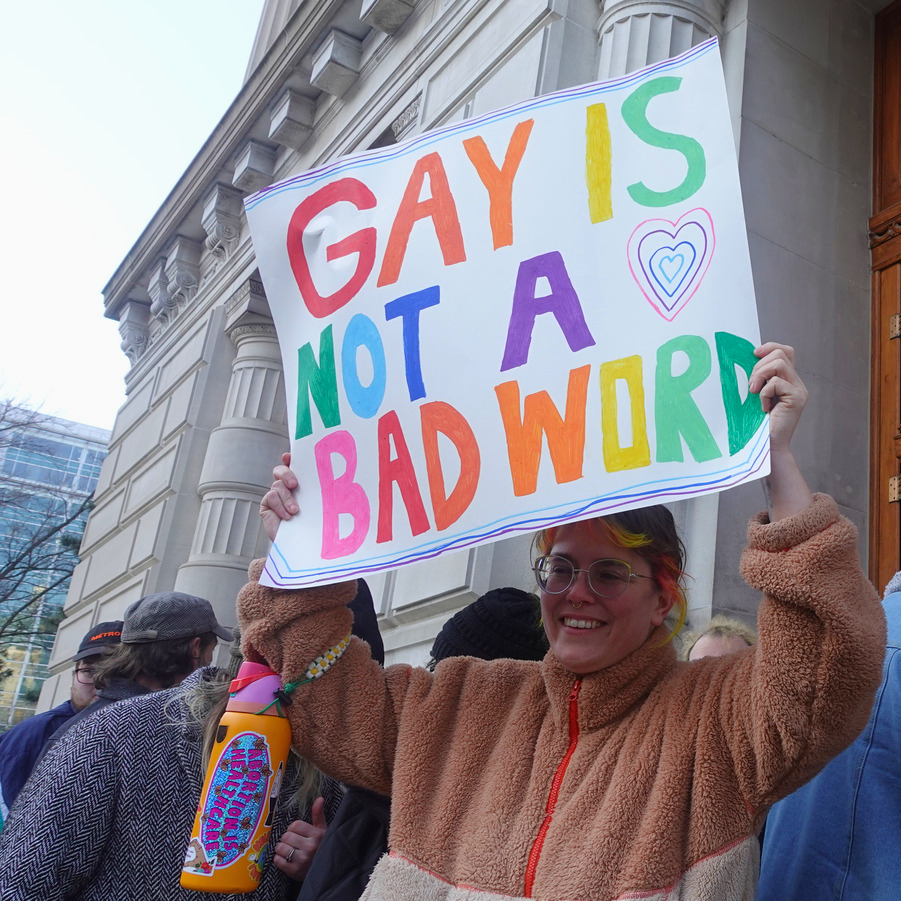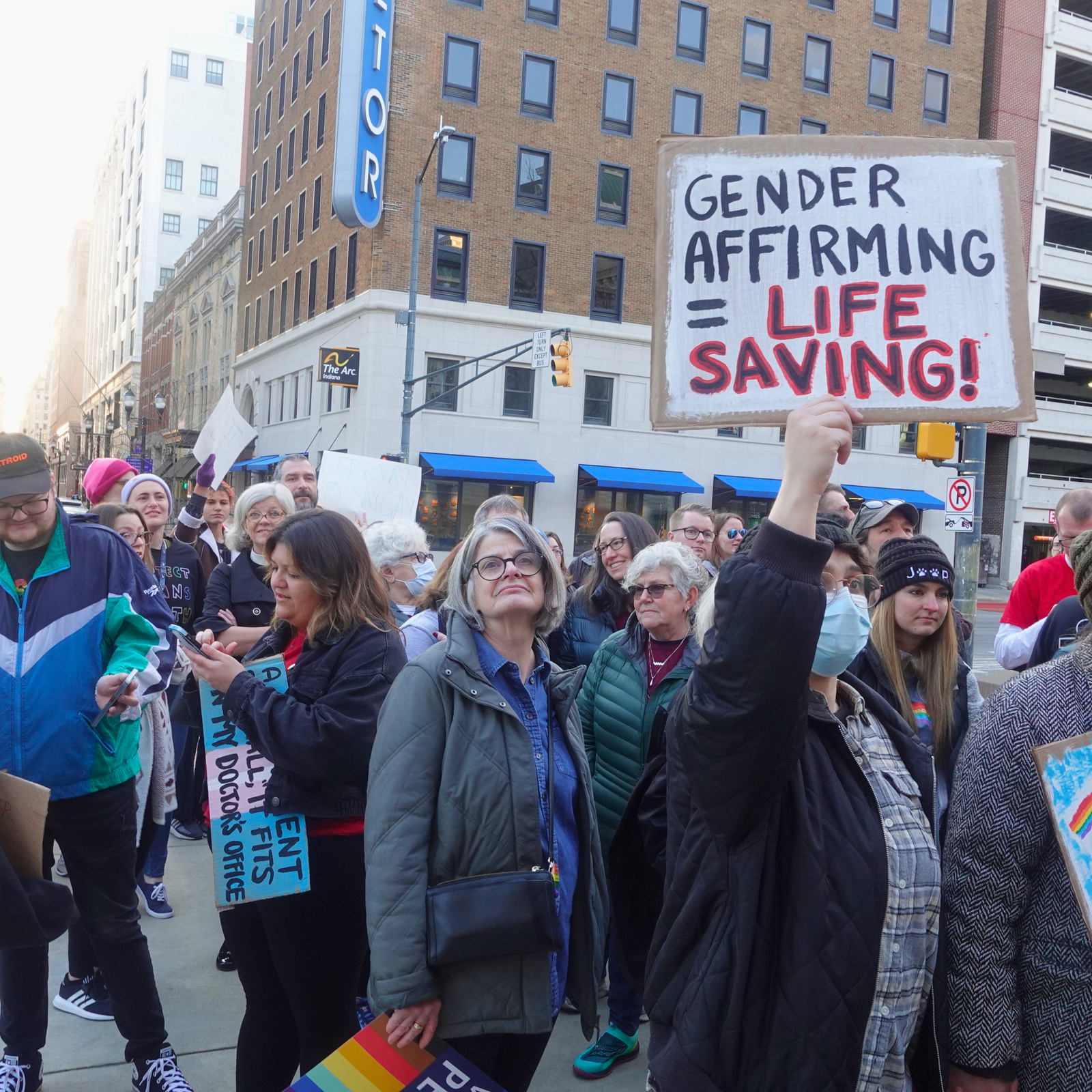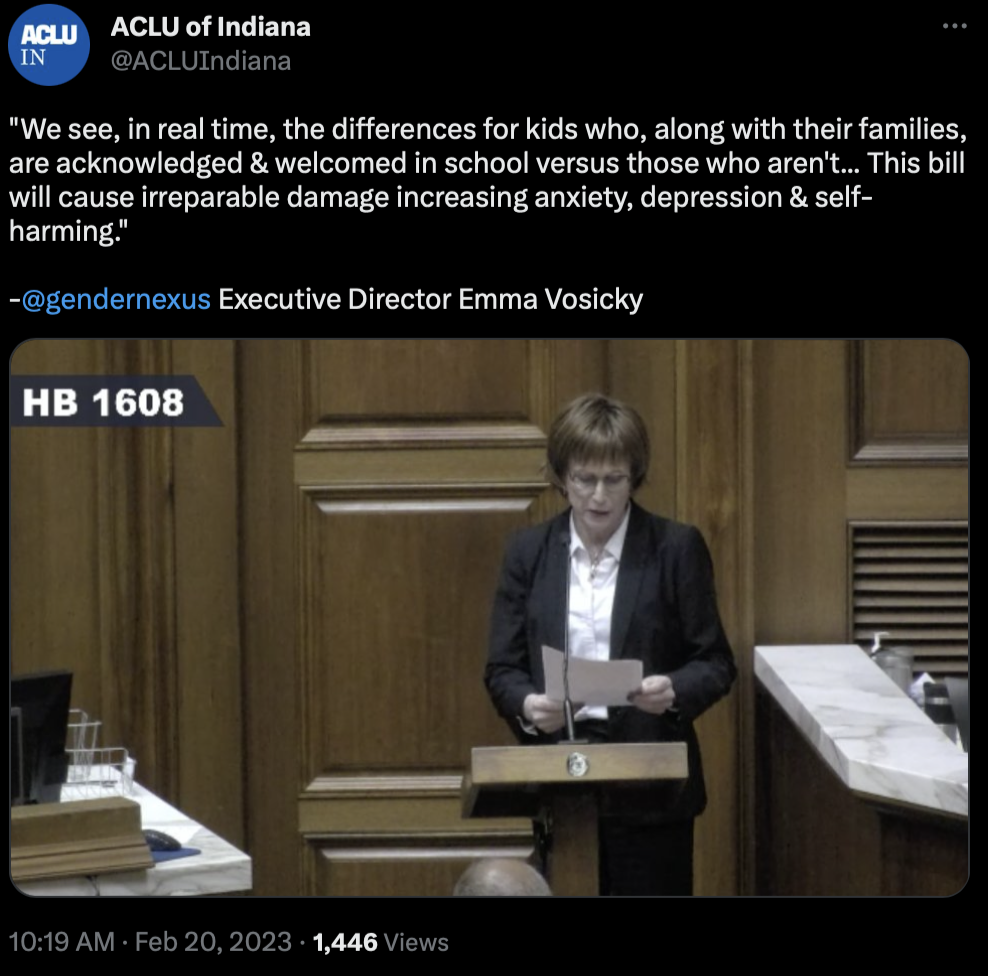Indiana House Bill 1608 went to the Senate after House Representatives voted 65-29 in favor on February 23.
The bill was introduced to Indiana lawmakers on January 19, 2023, under the Bill Title: Sexual orientation and gender identity instruction. Four Indiana Representatives, all republican, author HB1608. Republican Representative Rep. Michelle Davis (Republican, District 58) and co-authored by Representative Jake Teshka (Republican, District 7), Representative Chris Jeter (Republican, District 88), and Representative Robert Heaton (Republican, District 46).
Proponents say HB 1806 is about keeping controversial topics out of Indiana classrooms. LGBTQ+ Advocates say the bill is an attack.
There’s a deep divide in the Hoosier State. Indiana Legislators are a majority Republican and a majority voted yes on HB 1608. Then, there’s the Indiana Public advocating for LGBTQ+ people. At least 200 showed up to protest House Bill 1608 at the Statehouse in Indianapolis on February 20.
Penny May, a Junior at a public Indianapolis High School, joined the crowd of protestors chanting “Kill the Bill” and “We Say, Gay” for their representatives to hear. May says, “I have a queer family member. She is in third grade, and she recently came out. Right now is a really happy and exciting time for her.”
Her sister attends a public school, too, which May describes as a welcoming environment. She says about her sister’s recent experience, “she had a crush on one of her friends, and that was that. It was never a shameful thing…I try to protect that for her so she can continue to be happy and proud of who she is moving forward.”
Indiana lawmakers heard four hours of pubic testimonies on February 20, a week before the House took would vote on the legislation. All but a handful of public testimonies were against Indiana House Bill 1608.
After Indiana legislators voted to pass HB 1608, May said,
“I feel like my legislators don’t represent me. They’re just hateful. They wanted to silence queer people… It feels like it’s clearing the way towards pure hatred for an entire group of people.”
Summary Indiana House Bill 1608: Human Sexuality Instruction
- Provides that a school, an employee or staff member of a school, or a third party vendor used by a school to provide instruction may not provide any instruction to a student in kindergarten through grade 3 on human sexuality. It provides that a school employee or a school staff member is not prohibited from responding to a question from a student regarding certain topics.
- Provides that an employee or staff member of a school may only use a name, pronoun, title, or otherword to identify a student that is inconsistent with the student’s sex if the student, who is an adult or anemancipated minor, or the parent of an unemancipated minor requests in writing the use of a specific name,pronoun, title, or other word to identify the student. It also provides that a request must be submitted at the beginning of a school year.
- Requires a school to notify the parent of a certain student of a request made by the student to change the student’s name, pronoun, title, or other word to identify the student that is inconsistent with the student’s sex.
- Provides that a school may not discipline an employee or staff member of the school for using a name, pronoun, title, or other word to identify a student that is consistent with the student’s legal name.
Indiana House of Representatives Vote Yea or Nay for HB1608
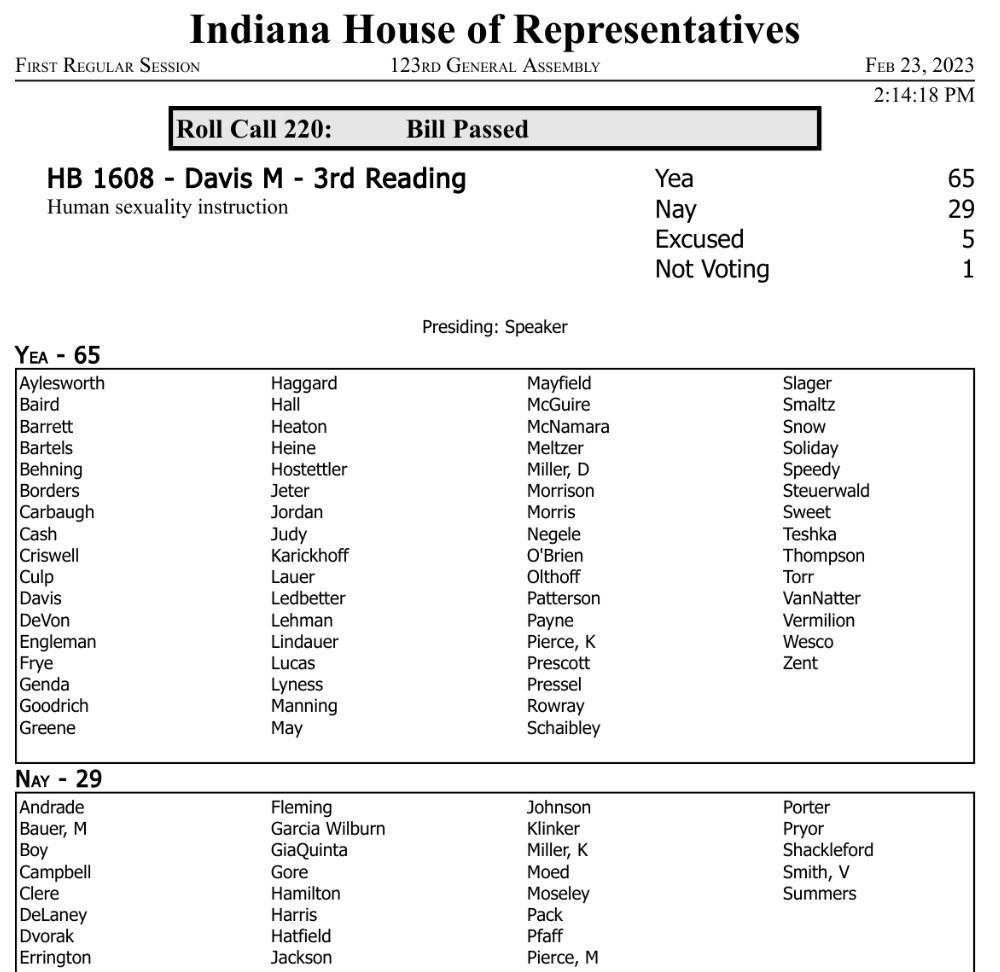
Click here to view Indiana House Bill 1608 details, actions, versions and more.
Indiana House Bill 1608 Bans Instruction on Human Sexuality in Grades K-3
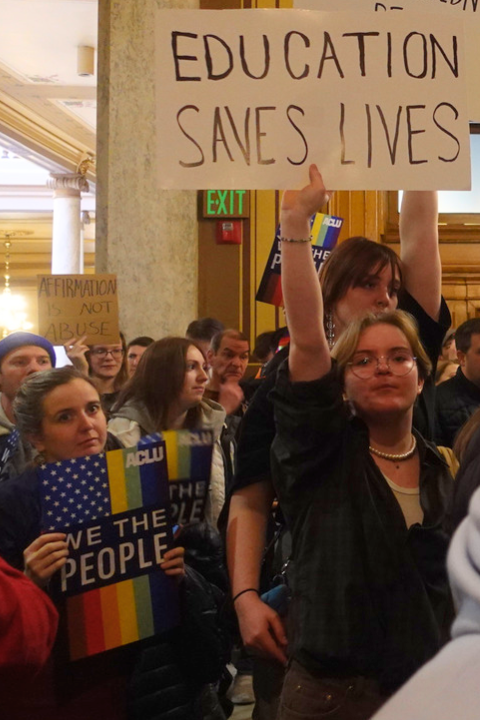
House Bill 1608 bans any instruction to a student in kindergarten through grade 3 on human sexuality
The bill’s authors leave room for interpretation of what’s considered “instruction on human sexuality.”
Davis says ‘human sexuality’ encompasses “the way people experience and express themselves sexually.” She noted that the change intends to prevent sex education from being taught to younger Hoosier students (Source: Indiana Capital Chronicle).
Indiana is one of 21 states that does not require sex education courses in schools. Without statewide sex ed requirements, it’s unclear how many schools in Indiana offer it in the curriculum (Source: Chalkbeat Indiana).
Opponents of HB 1608 claim schools are not teaching sex education to kids in grades k-3, deeming the bill unnecessary. However, they understand the legislation’s underlying message, which threatens LGBTQ+ people.
The bill’s original version did not use the term “human sexuality” at all, nor did it reference sexual education. Republican authors first wrote it to ban any instruction to a student in kindergarten through grade 3 in which the goal or purpose of the education is to study, explore, or inform students about: (1) gender ; (2) gender roles; (3) gender stereotypes; (4) gender identity; (5) gender expression; or (6) sexual orientation.
The amended bill removes the mention of those topics listed above, which would essentially ban LGBTQ+ education and conversations in public school, and replaces it with the term “human sexuality.” But that’s not enough for LGBTQ advocates who call out the underlying hate and discriminatory nature of Indiana House Bill 1608.
Co-author of House Bill 1608, Rep. Teshka, says,
“As elected officials, we have a sacred duty to represent our constituencies. Part of that constituency are parents who think they should have a right to speak to their children in a manner they wish about these subjects, at a time that they wish…, and in a manner consistent with their faith, development, worldview….”
Teshka adds that he is one of those parents. Indiana House bill 1608 now waits for a Senate vote.
Community defends LGBTQ+ education in schools
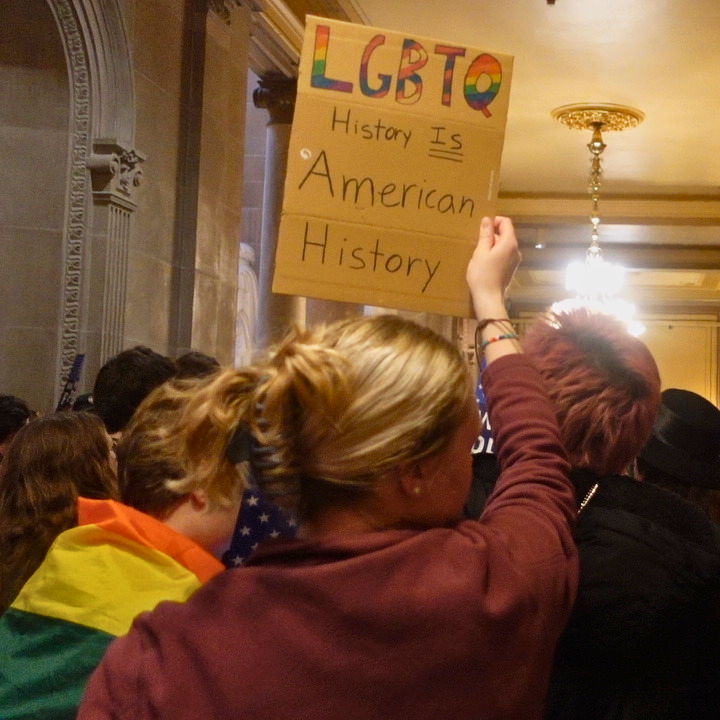
In opposition to Bill 1608, Reverend Dakota Roberts, with St. Peters United Church of Christ, gave testimony to lawmakers at the Statehouse on Monday, February 20, during the Committee on Education hearing.
He said, “This bill’s author should concern yourselves…with upholding the constitution of equality for all instead of enforcing a narrow-minded worldview….”
Multiple faith leaders gave testimonies against HB 1608. With New Joy Lutheran Church, Pastor Chis Duckworth challenged Rep. Jake Teshka on the terms “human sexuality” and “instruction.” He urges lawmakers to consider how this bill would “push aside” and “discourage” LGBTQ students and educators in public schools.
“Let’s say we have a history project, and a third grader wants to present on Harvey Milk. And the student shares the project with the classroom or for a school event. Is that instruction? Is that going to be pushed aside or discouraged?”
Harvey Milk is the first known and recognized openly gay man elected to public office in the United States (Source: Legacy Project Chicago). Pastor Duckworth presses concern that HB 1608 would make it so that a student’s presentation on this historical and political figure is banned as instruction on human sexuality.
Duckworth says educators have the right to “respond and create a setting that encourages and supports that child….,” who may have LGBTQ family members or personally identifies as LGBTQ.
Katie Blair, Advocacy and Public Policy Director at ACLU of Indiana, says the bill is meant to silence and threaten LGBTQ+ students and educators. In a statement released, Blair says:
“This is not about parental rights. This is not about teaching sex-ed. If it were, HB 1608 would explicitly name sex education… Indiana legislators use a broad, undefined term, ‘human sexuality,’ to ultimately erase conversations about LGBTQ Hoosiers.”
Indiana House Bill 1608 Allows Gender Policing in Public Schools at All Grades
Indiana House Bill 1608 would require parents to submit written content and request at the beginning of the school year for school employees and staff members to use a name/title/pronoun inconsistent with the student’s sex.
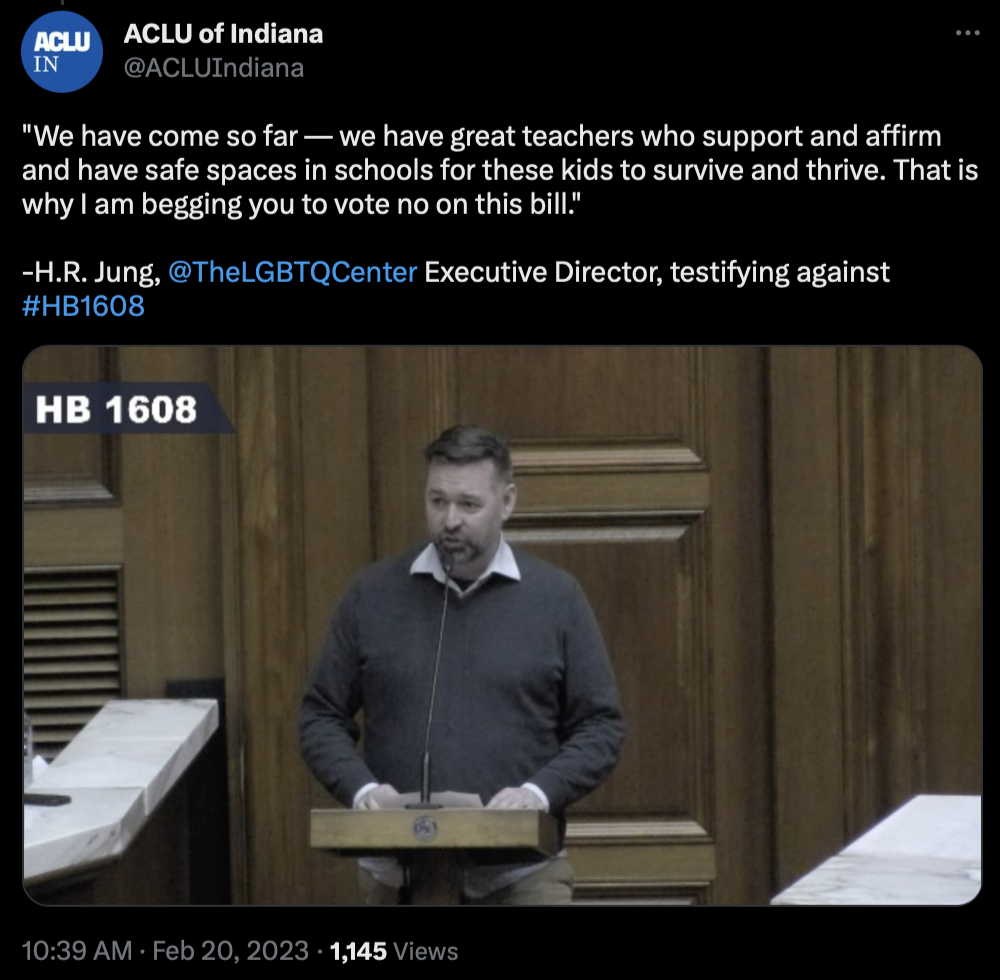
Without a parent’s written consent and request, or unless the student making the request is an emancipated minor, school employees and staff are not allowed to use inconsistent names/titles/pronouns for their students. Rep. Davis says the bill is meant to promote transparency between parents and schools.
However, LGBTQ youth advocates say it’s not unlikely for these kids to lack the support of their parents. They argue schools and educators should offer a welcoming and affirming place for students when they don’t have that at home.
At the hearing on Monday, educators spoke out against this specific requirement to outs students. Carissa Dollar, a mother of LGBTQ daughters and 7th grade teacher for Warren Township School District says, “as a teacher, students’ physical, mental, and emotional safety is my priority. Please do not take away my right to respect my students’ identity.”
LGBTQ advocates also argue that the bill will severely impact the health outcomes of LGBTQ youth. They say when lawmakers treat LGBTQ conversations as taboo, it adds to the stigma and discrimination people in the community suffer.
Trans Youth Advocates Push Back Against Outing Kids to Parents
Indiana House Bill 1608 requires schools to inform parents if their child requests to be called a name/title/pronoun in school that’s inconsistent with their sex.
When a student requests to go by a preferred name/pronoun without a parent’s consent and request to the school, the law requires the school to tell the student’s parent about their child’s request.
Proponents of the bill argue parents have the right to know that their child wants to go by a name/title/pronoun inconsistent with the student’s sex. Rep. Davis, who authored the bill, says,
“We need to respect parents. Teachers are there to teach; they are not there to be the parents, and they are not there to hide information from parents. We have the right as parents to know what is happening in the school building concerning our children… Parents are called by God and by birthright to their children…Taking that away from a parent is taking away parental rights.”
On the other end of the argument, LGBTQ+ advocates say outing a student is not okay. They say doing so would erode the trust between student and educators and would harm for trans youth.
Pastor Duckworth says, “I feel like we erode a trust between child and student when teachers get to become reporters to parents.” He questioned where lawmakers draw the line on gender policing, suggesting a scenario where teachers notify parents if they believe the student wore something to look “a little feminine.”
The bill does not require schools to notify parents when students wear clothes inconsistent with their sex. Duckworth’s question is hypothetical. It’s meant to test how far republican lawmakers would go with gender policing in schools. Opponents of the bill say HB 1608 will only add to the pain and suffering of trans kids.
Rachael Burke raised concern to lawmakers that the bill would contribute to the number of Transgender youth who experience homelessness. She delivered testimony opposing HB 1608, speaking for the Indiana PTA. She says, “1/4 of transgender students end up homeless for an extended period… majority say because they were rejected by their parents and no longer had a place to live. Outing students to their parents leads to rejection. This bill requires that students be outed to their parents.”
Lawmakers also hear concerns about this bill’s mental and emotional impacts on trans youth. Emma Vosicky, CEO at Gender Nexus, argues passionately for trans children to receive support that fosters equitable health outcomes for trans youth. For her testimony to lawmakers at the Statehouse, Vosicky introduces herself as a person who is an attorney, a lesbian, and a trans woman.
Vosicky tells lawmakers that trans youth who receive equitable familial, social, and educational structures have similar mental health outcomes as non-trans kids. “It’s about the government and society pulling support, leading to depression, anxiety, and suicide for Trans youth. It is not the kids themselves,” she says.
Then she tells lawmakers how the bill may jeopardize students’ safety. Vosicky says, “(the) amendment will force teachers or allow teachers to outs students. Williams Institute says that violence occurs for LGBTQ kids and adults at four times the rate. You are about to expose every child so that a teacher could have that ability.”
It’s a scary and disturbing point, but it’s all too real, and somebody had to bring it to the Statehouse floor. When students are made to feel that their trans identity is wrong or cause for shame by a school employee, it gives that authority figure the power to take advantage of vulnerable student by threatening to report their gender identity to a parent.
This bill section, which requires schools to inform parents of a student’s request to use preferred name/pronouns, applies to students in all grades at Indiana Public Schools, not just K-3. The amendment would impact teens and young adults who are exploring their identity and sexuality at an age where that’s a natural and relatable experience. The bill implies that teens and young adults don’t own their gender identity; adults do. In this case, their parent.
Vosicky leaves powerful remarks on the Statehouse floor:
“This bill bullies kids,” “This bill will kill people,” and “This bill will drive LBTQ people back in the closet.”
Trans woman tells Indiana lawmakers ‘adults have no decision’ about a young person’s sexual orientation
Deonyae Valentina’s testimony to lawmakers against Indiana House Bill 1608 was personal. She starts by saying, “I do not support this bill because adults have no decision to make about another young person’s sexual orientation. It comes naturally.”
Valentina is a transgender woman. By age 6, she knew her sexual orientation and gender identity differed from boys. She says she acted a little feminine, but not enough for anyone to know her secret.
Valentina didn’t live with her family growing up but maintained a relationship with her mother. They didn’t spend much time together, so Valentina did not talk to her parent about navigating her gender identity and sexual orientation.
Valentina learned about the LGBTQ community at age fourteen as a 9th-grade student at an Indiana Public School. The instruction put a positive light on LGBTQ+ people and activism, unlike the offensive slurs and stigma she’d experienced up to this point.
“My teacher’s name was Ms. Kenya. She taught me about Harvey Milk. It was history month, or history language arts…,” says Valentina. “I will never forget that moment…I had heard the F word a lot but didn’t know what that meant. I knew nothing about LGBTQ+ history or what it even meant.”
At age 16, Valentina turned to Brae, a counselor she met during high school, for guidance to navigate her life and identity. “He was another LGBTQ+ person who could relate,” says Valentina. “Brae was living proudly in his queerness. That really brought me into mine, seeing him demonstrate his.”
Valentina struggled with her identity but continued to learn about herself, taking steps toward self-acceptance. Despite coming out as queer, she still was hiding her transgender identity. “It was very secretive to me… I didn’t want anyone to know.”
She came out as a queer, transgender person to her therapist, who was also the first to know Valentina by her new, preferred name, her last name only. Besides her therapist, she kept her trans identity a secret until she was ready to take that step. She says her therapist gave her the space to to slowly gain self-acceptance.
“He respected me when I wanted to be me. He respected me when I didn’t want to be me,” says Valentina. “I wasn’t comfortable with myself back then.”
When she knew she wouldn’t suffer rejection from her parent, that’s when Valentina shared her queer, trans identity with her mother. The two regained trust in therapy and that allowed Valentina to open up to her family. She says,
“She was affirming, and that changed the atmosphere of everything for me. After I could come out to my mom, I could come out to my brother. Then I could come out to anybody because I know my mom will have my back; my mom will be able to say, ‘yes, this is who she is, this is who she wants to be, and this is who she was meant to be.’
The parental support from mom gave Valentina more security and confidence. She though if her family accepts her identity then, everyone else would fall in line. However, for the republican authors of HB 1608, parental rights only go so far when it comes to affirming the identity of trans children attending Indiana public schools.
Indiana House Bill 1608 Protects School Staff Who Reject Trans Students’ Identity
HB 1608 would prevent schools may not discipline an employee or staff member for using a name/pronoun/title consistent with a student’s legal name.
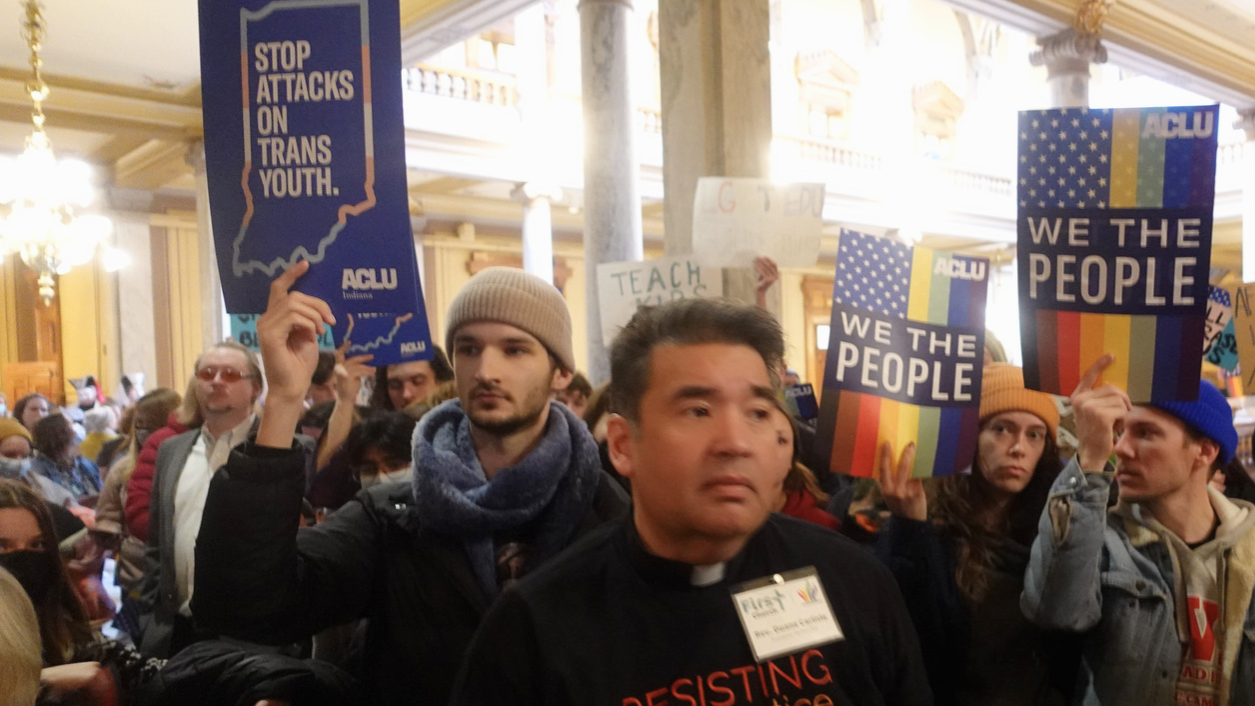
In other words, HB 1608 gives individual educators the right to deny the preferred pronouns/name/title, even if that student has the support and consent of their parents.
This section of the bill wasn’t in the original version. Lawmakers made the amendment after hearing public testimonies in favor of educators’ individual rights to reject what one person called “radical gender ideology.”
One public testimony to lawmakers said:
“We would never demand that a teacher responds to a student saying ‘Christ has risen’ with the traditional response ‘he has risen indeed’…because doing so would force a teacher to affirm a belief or ideology with which they disagree. The same is valid for gender ideology.”
Conservative Indiana voters and representatives say parents are free to request that teachers and staff use preferred names and pronouns. However, where those parental rights end is when the parent’s request compels another person to speak a message they disagree with.
Micah Clark, Director of the American Family Association of Indiana, testified in favor of the amendment. He protects a person’s right to reject another person’s preferred names/pronouns, saying, “I believe that both god and science say that people are either male or female. Such things cannot change. They are designated as fixed biological traits at birth that go far beyond feelings or appearances.”
Authors of the bill asked an attorney during Monday’s hearing about potential conflict with Title 9.
Title 9 of the Education Amendments of 1972 (Title IX) prohibits sex (including pregnancy, sexual orientation, and gender identity) discrimination in any education program or activity receiving federal financial assistance (Source: U.S. Department of Health & Human Services)
Attorney Matt said, “several states, including Indiana, have filed a lawsuit against the Biden administration over their interpretation of Title 9. A federal court issued an injunction saying the Federal government cannot enforce their radical new interpretation of Title 9.”
In recent months, The Biden administration made attempts to protect LGBTQ+ rights in schools, particularly around the use of pronouns/names (Source: Indiana Chalkbeat). It’s the position of Rima Shahid, CEO at Women4Change Indiana. She believes schools should accept students’ preferences on the matter.
Shahid says in her testimony to lawmakers, “we must continue to foster an inclusive and accepting environment in our classrooms where all students feel safe, seen, and heard. All students, regardless of gender identity, should receive an education that values and affirms their identity.”
Opponents of HB 1608 say a bill that claims to be about ‘parental rights’ would ensure that parents have the final say on the name/pronouns of their child. They describe the amendment as “illogical” and “immoral.”
Among those that oppose is Representative Vernon Smith, a Democrat, who voted no on the amendment and the overall bill. He tells his constituents, “We are in education and government to serve the people. Why should we get so upset about a pronoun or a name that we lose the educational focus?”
LGBTQ+ advocates say HB 1608 would allow school employees to reject the identity of trans students. Vosky, with Gender Nexus, says kids and grown-ups whose identities and existence aren’t acknowledged are emotionally and mentally hurt by the rejection.
Describing her experience as a trans woman, Vosicky says,
“I still feel the pain from the earliest days. Neither I nor anyone else could simply see or accept me for me. This bill will prevent teachers and youth from showing up in schools as their whole selves. ”
LGBTQ+ Hoosiers Want a Less Conservative, More Welcoming Indiana
On February 23, 2023, the Indiana House of Representatives passed HB 1608, 65-29. It was referred to the Senate the next day. If the Senate passes HB 1608, it will go to the President to pass or veto.
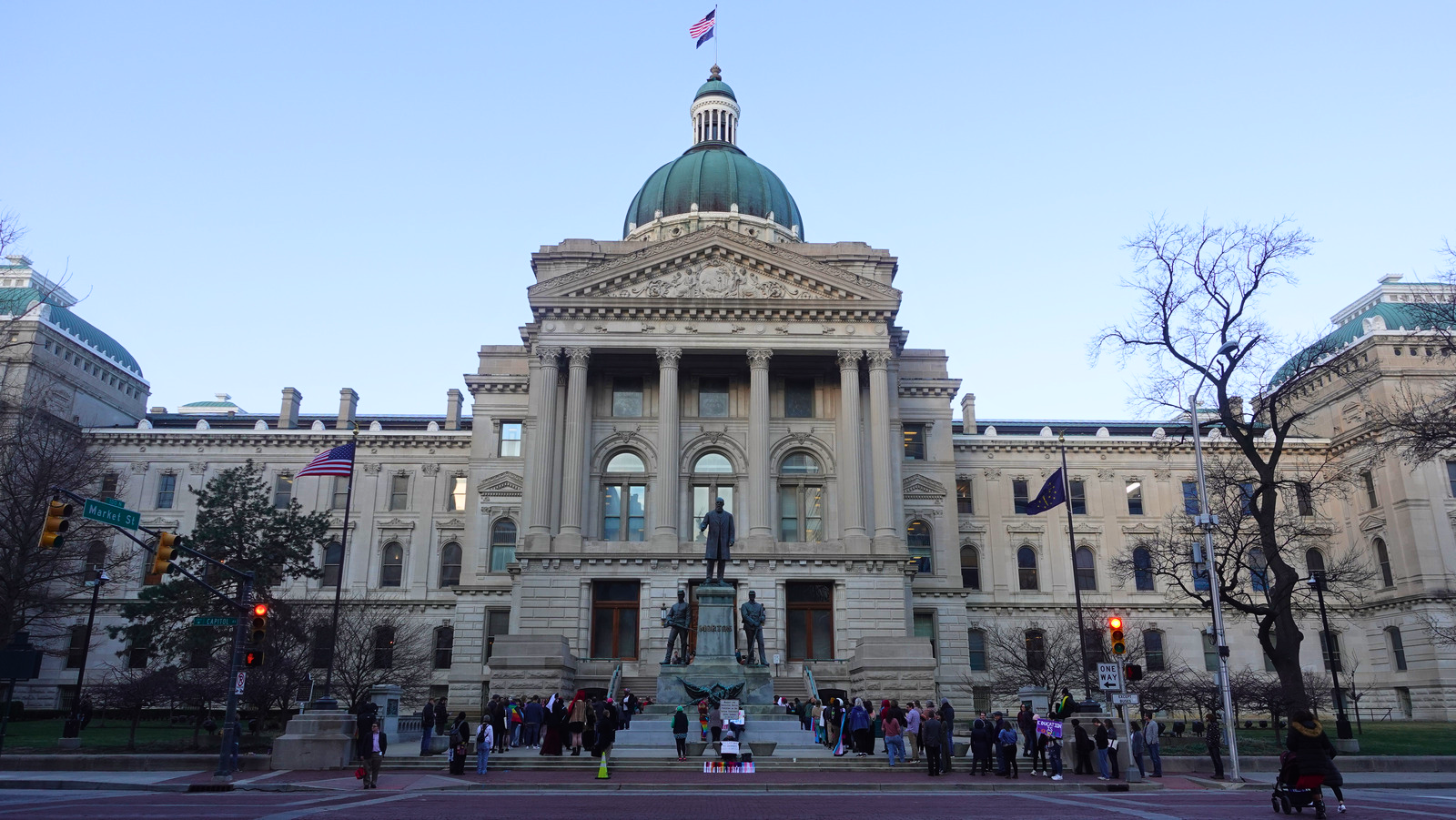
It’s no secret to Republicans that President Biden stands behind trans youth and protects the use of their preferred names and pronouns (Source: Politico). Many in the LGBTQ+ community praise Biden for his inclusive agenda. Others say the administration is not doing enough for LGBTQ+ rights, as lawmakers across the country try to pass a flood of legislation targeting LGBTQ+ people. (Source: Teen Vogue)
In Indiana, there are some LGBTQ+ people and allies that say they will consider leaving the state if it continues to pass harmful and conservative politics against LGBTQ rights. Other LGBTQ+ people and allies are Hoosiers through and through. They have no intention of handing Indiana over to conservative politicians and voters.
Jenny Boyts, Board President of Indy Pride, gave testimony to lawmakers at the Statehouse on February 20. Indy Pride exists to unite and serve the LGBTQ community of Central Indiana. Boyts says they oppose HB 16080 and warn elected officials not to dismiss the growing LGBTQ community in the Hoosier state.
Last year’s Indy Pride Parade attracted an estimated 65,000 attendees. Indy Pride also hosts several events throughout the year and saw 100 thousand participants, LGBTQ, and allies, for their 2022 season. The organization expects another big year in 2023, with the Parade scheduled for Saturday, June 10 (Source: Indy Pride)
On Monday, Boyts told Indiana House Representatives,
“Let this be a cautionary tale that we are here; we are Hoosiers, too. Our families and our communities will not be erased.”
